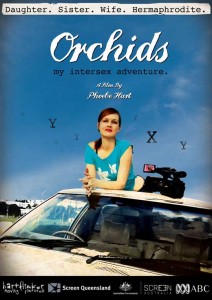
Official poster for the film.
Source: Orchids Facebook page.
Phoebe Hart knew from a young age that she wasn’t like other girls. When she finished high school, her parents told her that she was born with a genetic condition called Androgen Insensitivity Syndrome, or AIS, meaning that she had male chromosomes and undescended testicles.
AIS is one of many intersex conditions, in which people’s genes or genitalia do not fit neatly into the categories of male and female. Intersex conditions are quite common–the film mentions that as many as 1 in 100 children born may be intersex–but both the conditions and intersex people themselves are hidden and misunderstood. In Hart’s case, she was pressured into a questionably necessary surgery to remove her testicles, and her family talked so little about their secret that she didn’t learn until years later that one of her younger sisters had the same condition and was going through many of the same challenges. In her director’s statement, Hart says that after everything she has experienced, “Now I actively seek to disrupt this cataloging and meddling with as much honesty and humour as I can muster. It’s the reason why I wanted to make this film.”
In the documentary, which took six years to make, Hart sets out on a cross-country trip with her sister Bonnie to meet other intersex people and come to terms with herself and her family. Many of the stories they hear are profoundly personal and tragic, and both sisters grapple with difficult issues in their pasts and present, but the film always keeps a note of positivity and humor. Background information about intersex conditions is illustrated with fanciful sequences of Greek statues and colorful orchids (a symbol repeated throughout the film). The interviews, Hart’s own story and narration, and the background information combine to create a moving and nuanced whole. The film contains powerful critiques of normative ideas of gender, sex, and normalcy but remains accessible and genuinely emotional.
As a documentary, the film is very personal and reflexive. The two sisters are the subject of the film, but both also filmed and made directorial decisions. Often, the film includes their discussions of the shots or their feelings about the project itself, presenting the viewer with many layers to read and consider.
Orchids won several awards, including Australian Directors Guild’s Best Direction in a Documentary and the Brisbane International Film Festival’s Best Documentary, and has been shown at many LGBT film festivals. Swarthmore’s Professor Patty White praised Hart’s “warmth and candor,” calling the film “engaging.” A senior endocrinologist at the Melbourne Royal Children’s Hospital said, “Personally I could not imagine a better film ever being made on coming to terms with a condition like AIS. It’s wildly funny in parts but at the same time it’s very intimate and deeply moving. I can’t stop thinking about it.”
Further Reading:
Available on Tripod
Trailer on Vimeo
Women Make Movies entry
Filmmaker’s Website, hartflicker
ABC Local interview with Phoebe Hart
Director’s Statement, more information
AIS Support Group, list of books and articles
WMM Gender Collection, including more films dealing with intersex issues
Intersex Society of North America, “Ambiguous Sex” or Ambivalent Medicine?
More intersex resources on Tripod
Phoebe Cook, April 10 2013
